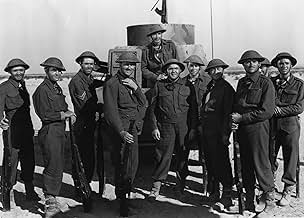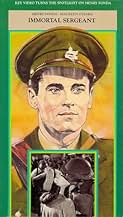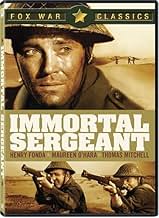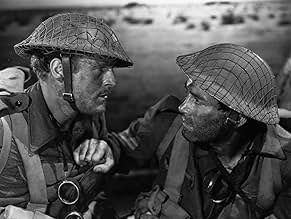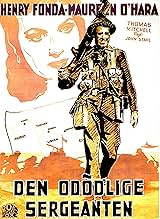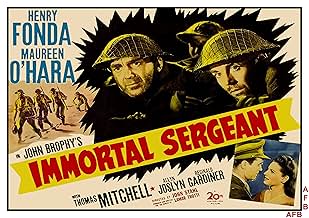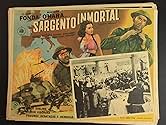ÉVALUATION IMDb
6,6/10
1,1 k
MA NOTE
Ajouter une intrigue dans votre langueDuring a WW2 patrol in the North-African desert, a Canadian corporal reminisces about his sweetheart and must lead his platoon when the sergeant gets wounded.During a WW2 patrol in the North-African desert, a Canadian corporal reminisces about his sweetheart and must lead his platoon when the sergeant gets wounded.During a WW2 patrol in the North-African desert, a Canadian corporal reminisces about his sweetheart and must lead his platoon when the sergeant gets wounded.
- Prix
- 3 victoires au total
John Banner
- Officer
- (uncredited)
Wilson Benge
- Waiter
- (uncredited)
Lane Bradford
- Returning Soldier
- (uncredited)
James Carlisle
- Party Guest
- (uncredited)
Gordon B. Clarke
- Soldier
- (uncredited)
Ruth Clifford
- Nightclub Patron
- (uncredited)
James Craven
- NCO
- (uncredited)
Oliver Cross
- Nightclub Patron
- (uncredited)
Jack Deery
- Party Guest
- (uncredited)
Avis en vedette
Low-budget film with the sole purpose of serving as war propaganda for the entire Allied side. The protagonist, an antihero due to his wartime experience, unwittingly and subsequently consciously transforms into a hero. What a more fantastical transformation, when in reality, war often produces exactly the opposite. But well, any ammunition is necessary in the war effort, and what better ammunition than young volunteers, deceived by unfiltered and unscrupulous propaganda.
Well, but this veiled or blatant propaganda seems inevitable for any war-themed film production; you know it, and you have to deal with it.
Cinematographically speaking, the film barely passes with so little money; there are no visual resources for more than a desert as the main setting and the night that conceals everything, flaws included. Narratively, everything is focused on the film's main mission, so no one in the production has made an effort to offer more. Even Fonda, who accepted this supporting role, later regretted it in his biography.
But well, the only thing that saves it is that classic cinema has its charm, a mixture of black and white drama, close-ups that few actors today can endure, and that aura of times past, which in the collective imagination is mistakenly always considered better. Another interesting aspect not to forget is that the film is contemporary to the events narrated, and for war genre enthusiasts, it's always a pleasure to be able to enjoy them, even though it's impossible not to think that while some were giving their lives, fighting in battles or under the oppressive yoke of the occupying enemy, others could indulge in the magical world of the seventh art.
Well, but this veiled or blatant propaganda seems inevitable for any war-themed film production; you know it, and you have to deal with it.
Cinematographically speaking, the film barely passes with so little money; there are no visual resources for more than a desert as the main setting and the night that conceals everything, flaws included. Narratively, everything is focused on the film's main mission, so no one in the production has made an effort to offer more. Even Fonda, who accepted this supporting role, later regretted it in his biography.
But well, the only thing that saves it is that classic cinema has its charm, a mixture of black and white drama, close-ups that few actors today can endure, and that aura of times past, which in the collective imagination is mistakenly always considered better. Another interesting aspect not to forget is that the film is contemporary to the events narrated, and for war genre enthusiasts, it's always a pleasure to be able to enjoy them, even though it's impossible not to think that while some were giving their lives, fighting in battles or under the oppressive yoke of the occupying enemy, others could indulge in the magical world of the seventh art.
This is the first American film about the North Africa campaign and the last film Henry Fonda made before reporting for the war. In fact he had tried to report earlier but studio head Zanuck had him deferred until this film was made.
"The Immortal Sergeant" tells the oft-told tale of a group of soldiers at risk trying to survive. The first version I can recall was "the Lost Patrol" a 1929 British silent film remade in 1934 by John Ford. Those films were based on the 1927 novel "Patrol" and the basic theme has been repeated since (e.g., 'The Thirteen", "Sahara", "Last of the Comanches", "Kokoda").
This 1943 film is an American propaganda film using the British fighting in Africa for the setting. Though this is obviously a studio film, the camera work is pretty good and some of the action sequences look good.
The cast is rich with 40s stars like Henry Fonda, Thomas Mitchell, Maureen O'Hara, and Reginald Gardiner. But they are merely going through the motions and there is nothing here you haven't seen before.
My favorite WW 2 fighting films made between 1942 and 1944 include "Wake Island" (1942), "Bataan" (1943) which also had Mitchell, "The Fighting Sullivans" (1944), "Flying Tigers" (1942), "Guadalcanal Diary" (1943), "The North Star" (1943), "The Rats of Tobruk" (1944), and "Thirty Seconds Over Tokyo" (1944).
There are a plethora of non-fighting WW 2 films that are worthy of mention – "Casablanca" (1942), "Lifeboat" (1944), "Hangmen Also Die" (1943), and "Five Graves to Cairo" (1943).
"The Immortal Sergeant" tells the oft-told tale of a group of soldiers at risk trying to survive. The first version I can recall was "the Lost Patrol" a 1929 British silent film remade in 1934 by John Ford. Those films were based on the 1927 novel "Patrol" and the basic theme has been repeated since (e.g., 'The Thirteen", "Sahara", "Last of the Comanches", "Kokoda").
This 1943 film is an American propaganda film using the British fighting in Africa for the setting. Though this is obviously a studio film, the camera work is pretty good and some of the action sequences look good.
The cast is rich with 40s stars like Henry Fonda, Thomas Mitchell, Maureen O'Hara, and Reginald Gardiner. But they are merely going through the motions and there is nothing here you haven't seen before.
My favorite WW 2 fighting films made between 1942 and 1944 include "Wake Island" (1942), "Bataan" (1943) which also had Mitchell, "The Fighting Sullivans" (1944), "Flying Tigers" (1942), "Guadalcanal Diary" (1943), "The North Star" (1943), "The Rats of Tobruk" (1944), and "Thirty Seconds Over Tokyo" (1944).
There are a plethora of non-fighting WW 2 films that are worthy of mention – "Casablanca" (1942), "Lifeboat" (1944), "Hangmen Also Die" (1943), and "Five Graves to Cairo" (1943).
It is not as good as "An Ice Cold in Alex" but next to it. It's the same kind of desperately desolate desert with no hope, no water, only the constant peril of the Germans, all lives constantly at stake, and some occasional actual fights. Most of the action takes place in the night, so you don't see much of the arid landscape, fortunately, and there are some moments of relief. The acting is superb by everyone, Thomas Mitchell above all as the sergeant, and Henry Fonda, as the corporal, while Maureen O'Hara sparkles in all her beauty only in flashbacks. These flashbacks actually constitute the main cinematic attraction of the film, because they show the ideal life dreamed about in times of wine and roses from the utter darkness of the abyss of the desperate war situation. It's a Great War film, and the last film Henry Fonda made before enlisting for the war himself.
Henry Fonda looks just like he appeared in 1940's "The Grapes of Wrath."
This is quite a good film detailing several soldiers caught in Africa during World War 11 and how they eventually overcome their perils.
Thomas Mitchell, as the old-time sergeant is a standout here. There is able support by Allyn Joslyn, Reginald Gardiner and others.
Maureen O'Hara is used mainly in flashbacks here as Fonda thinks back of his past while trying to lead his men to freedom.
The ending seems rushed up as Fonda wakes up in the hospital and is told how they got out of their predicament.
This is quite a good film detailing several soldiers caught in Africa during World War 11 and how they eventually overcome their perils.
Thomas Mitchell, as the old-time sergeant is a standout here. There is able support by Allyn Joslyn, Reginald Gardiner and others.
Maureen O'Hara is used mainly in flashbacks here as Fonda thinks back of his past while trying to lead his men to freedom.
The ending seems rushed up as Fonda wakes up in the hospital and is told how they got out of their predicament.
"Immortal Sergeant" was apparently not one of Henry Fonda's favorite film roles. I am not sure why "The Big Street" wasn't his least favorite (it was god-awful, believe me) but he disliked it. And, I might add, my wife wasn't super-fond a this film as we watched it. However, I really thought it was pretty good...though I do wonder if the main character played by Fonda might have been schizophrenic--that's because throughout the film he keeps hearing the voice of his sergeant--even though the guy is dead!
The film is a WWII propaganda film. Because of this, it's main thrust is NOT realism but to bolster folks' support of the war effort. I cut the film a bit of slack, as it was 1943 and keeping up morale was a major concern. What I didn't like was the casting of Fonda, as he was supposed to be a Brit--and seemed about as British as John Wayne or Hattie McDaniel! In this sense, I could see why he didn't like playing this role--but the plot is pretty good and more than makes up for this.
The sergeant in the title is played by Thomas Mitchell--and he's very good in this role. This guy is a career soldier and seems indestructible to his men--and he is adored by them. However, although he seems to have all the answers, his corporal (Fonda) seems quite different--unsure of himself and not at all the soldier Mitchell is. But, when the sergeant is killed and Fonda is left in charge of a small group of men in the North African desert, he's given a chance to show his mettle.
In many ways, this film is a lot like the film "Sahara"--though "Sahara" is a much more enjoyable (and less realistic) film. Both are set in the same locale and are about a small group of soldiers overcoming greater numbers of enemy soldiers. But the casting and script just weren't quite as good here--though the film STILL is enjoyable and did what the studio wanted it to do. I also appreciate how the men in this film were NOT indestructible--many died even though you KNEW how it all had to end. Not brilliant but quite entertaining.
The film is a WWII propaganda film. Because of this, it's main thrust is NOT realism but to bolster folks' support of the war effort. I cut the film a bit of slack, as it was 1943 and keeping up morale was a major concern. What I didn't like was the casting of Fonda, as he was supposed to be a Brit--and seemed about as British as John Wayne or Hattie McDaniel! In this sense, I could see why he didn't like playing this role--but the plot is pretty good and more than makes up for this.
The sergeant in the title is played by Thomas Mitchell--and he's very good in this role. This guy is a career soldier and seems indestructible to his men--and he is adored by them. However, although he seems to have all the answers, his corporal (Fonda) seems quite different--unsure of himself and not at all the soldier Mitchell is. But, when the sergeant is killed and Fonda is left in charge of a small group of men in the North African desert, he's given a chance to show his mettle.
In many ways, this film is a lot like the film "Sahara"--though "Sahara" is a much more enjoyable (and less realistic) film. Both are set in the same locale and are about a small group of soldiers overcoming greater numbers of enemy soldiers. But the casting and script just weren't quite as good here--though the film STILL is enjoyable and did what the studio wanted it to do. I also appreciate how the men in this film were NOT indestructible--many died even though you KNEW how it all had to end. Not brilliant but quite entertaining.
Le saviez-vous
- AnecdotesAccording to TCM's Robert Osborne, this was the last film Henry Fonda worked on before enlisting in the U.S. Navy during World War II.
- GaffesWhen the survivors come across the vehicle tracks after the attack on the Italian armoured car, multiple shadows of the soldiers can be seen, indicating multiple light sources.
- Citations
Sgt. Kelly: Drinking water is the worst thing in the world for a wound like mine.
[in the groin]
- ConnexionsEdited into All This and World War II (1976)
- Bandes originalesThe Campbells Are Coming
(uncredited)
Traditional
Played on the bagpipes at the beginning
Meilleurs choix
Connectez-vous pour évaluer et surveiller les recommandations personnalisées
- How long is Immortal Sergeant?Propulsé par Alexa
Détails
- Durée
- 1h 31m(91 min)
- Couleur
- Rapport de forme
- 1.37 : 1
Contribuer à cette page
Suggérer une modification ou ajouter du contenu manquant


